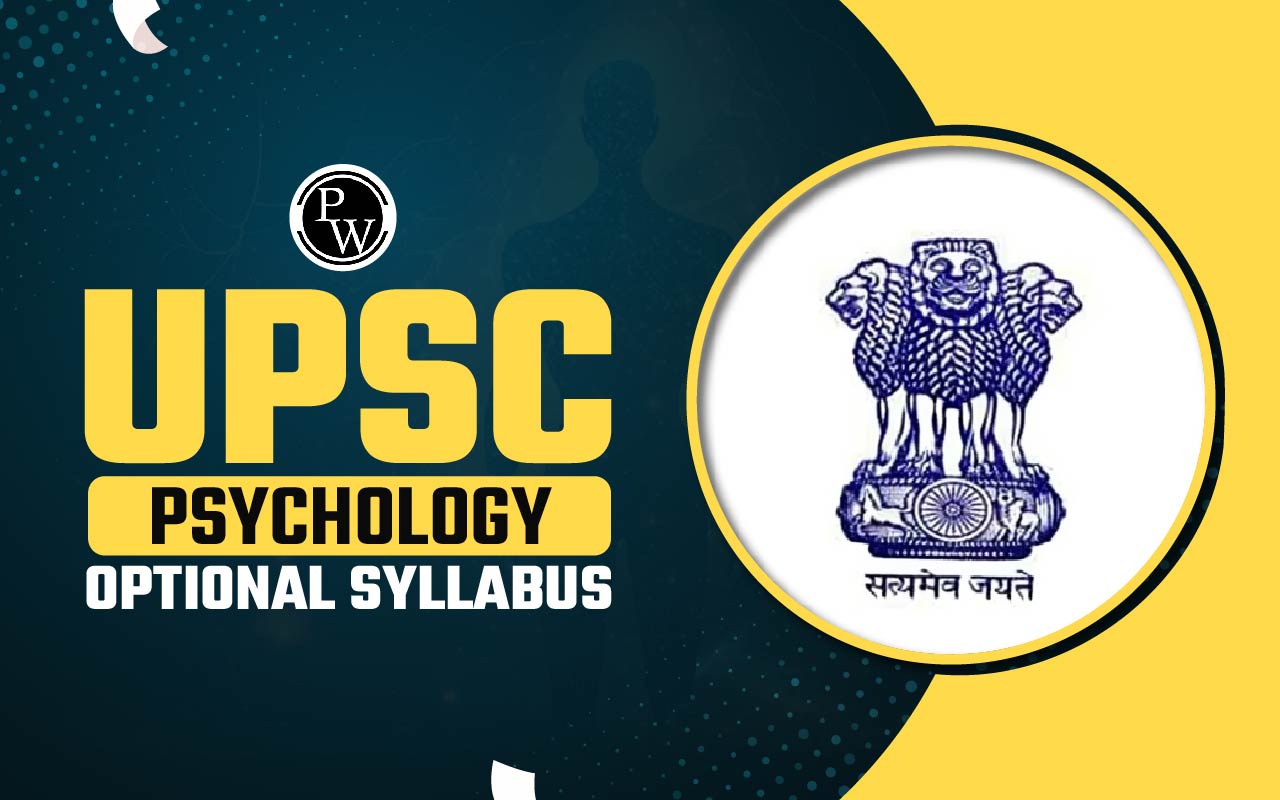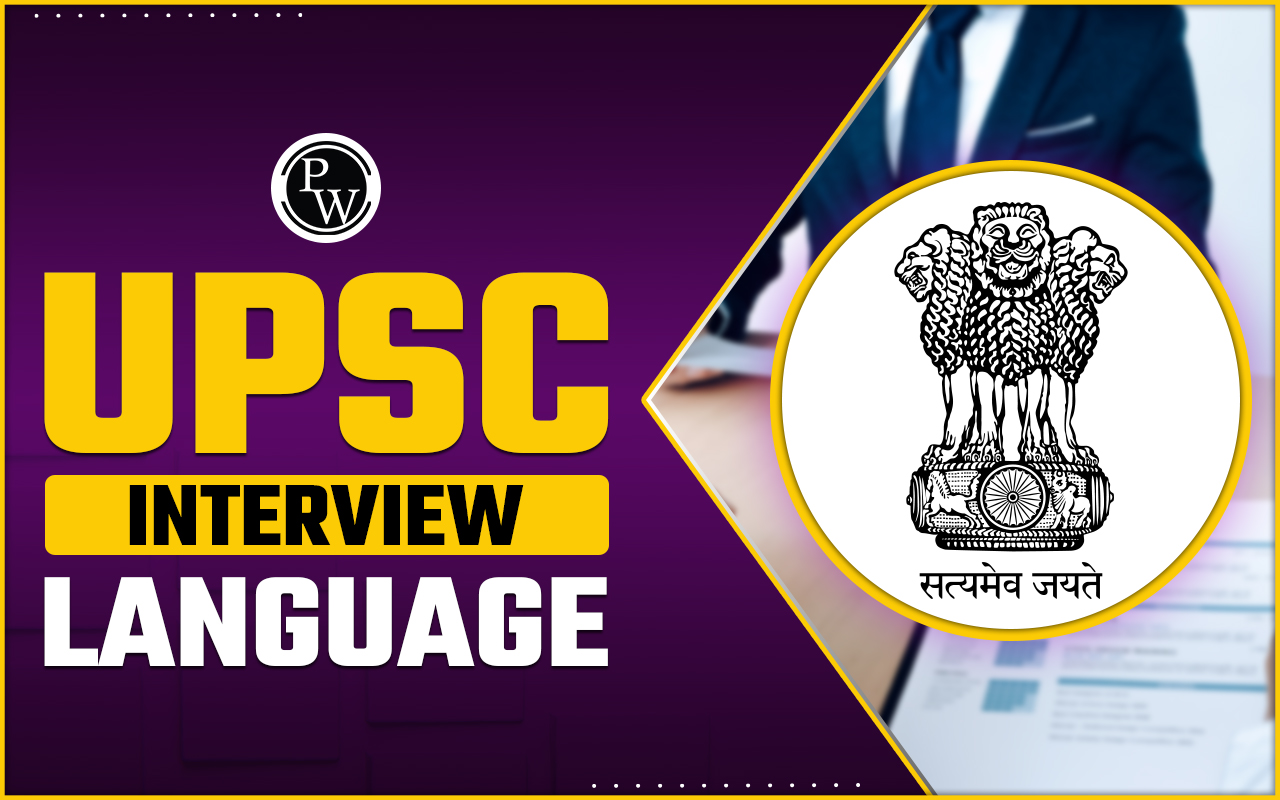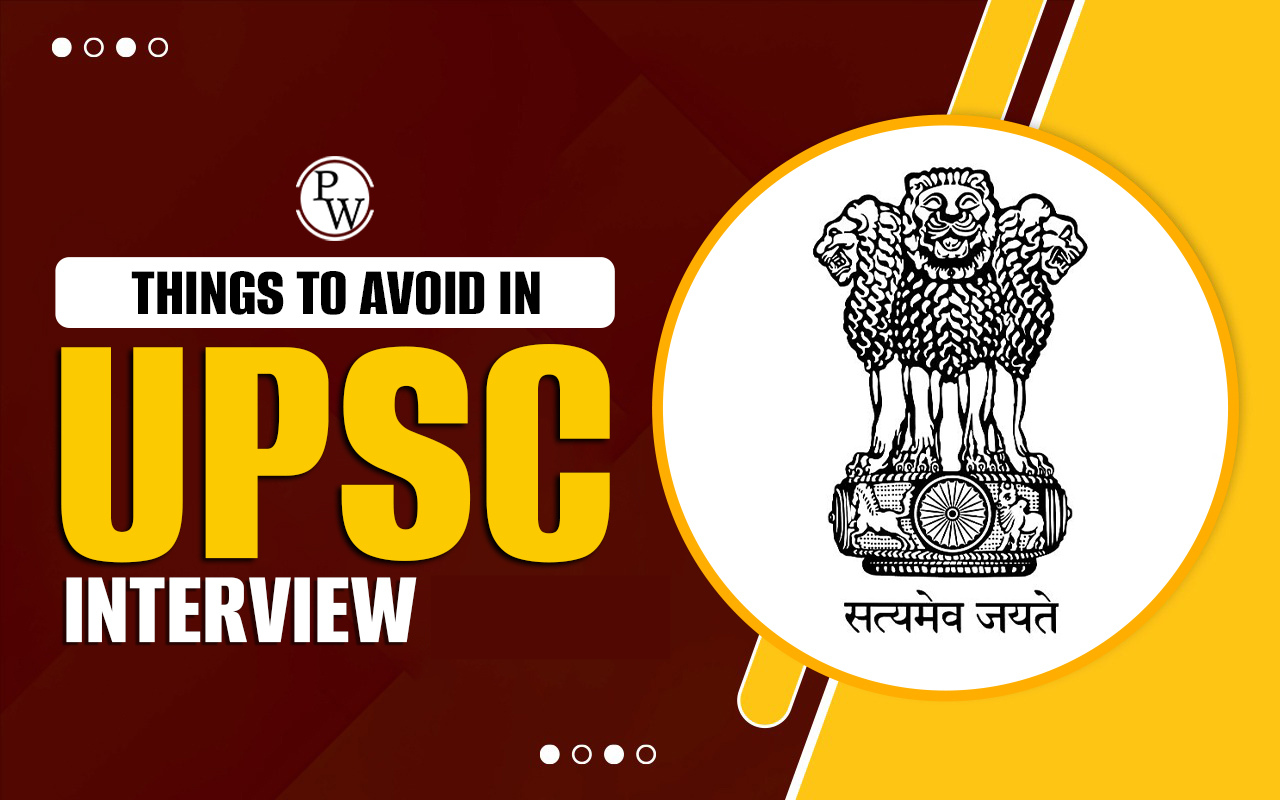

UPSC Psychology Optional Syllabus 2025: Are you looking for an optional subject that welcomes students of all backgrounds? Psychology is one of those subjects on the list of 48 UPSC optional subjects that any interested candidate can pick. Psychology optional perfectly balances the humanities with science, where students study human behaviour scientifically.
Candidates with a good command of the syllabus can easily score high marks in the psychology optional. The article provides a detailed paper-wise syllabus, the advantages of taking this subject, a booklist, and a strategy to prepare for the UPSC Psychology optional.UPSC Psychology Syllabus 2025
Psychology is the scientific study of the ‘mind and behaviour’. As a part of the UPSC Mains optional subject, Psychology focuses on fundamental concepts such as the human brain, various mental processes, social psychology, and their application. Psychology optional is challenging as well as rewarding. One of the major advantages of the Psychology optional in UPSC is that if you understand all the concepts of Paper 1, then Paper 2 will become a cakewalk. The weightage of both papers is 250 marks, with each having 8 questions divided into two sections, Section A and Section B. The pattern of the Psychology optional question paper is:| UPSC Psychology Optional Exam Pattern | |
| Total Papers | Two, Paper I and Paper II |
| Total Marks | 500 (250 Each) |
| Sections | Section A and Section B |
| Questions | Total 8 questions with subparts |
| Compulsory Question | Question No. 1 and 5 |
| Marks Distribution | 10, 15, and 20 marker questions |
UPSC Psychology Optional Syllabus 2025
The Psychology optional syllabus may look vast, but candidates can cover it with the help of standard books and online resources. The Psychology optional syllabus is divided equally between Paper 1 and Paper 2. The Paper 1 syllabus focuses on the foundation of psychology, and the Paper 2 syllabus emphasises the application of these concepts. The detailed syllabus of the psychology optional is as follows:UPSC Psychology Optional Paper 1 Syllabus
The UPSC has designed the syllabus for Paper 1 to give candidates an introduction to the major concepts of psychology. The Psychology optional syllabus of Paper 1 includes crucial subjects such as the emergence of psychology as a discipline, research methods, learning, memory, motivation, etc.The table below presents a complete syllabus for Psychology Paper 1:
| Foundations of Psychology (Paper I) | |
| Topics | Subtopics |
| 1. Introduction |
|
| 2. Methods of Psychology |
|
| 3. Research Methods |
|
| 4. Development of Human Behaviour |
|
| 5. Sensation, Attention and Perception |
|
| 6. Learning |
|
| 7. Memory |
|
| 8. Thinking and Problem Solving |
|
| 9. Motivation and Emotion |
|
| 10. Intelligence and Aptitude |
|
| 11. Personality |
|
| 12. Attitudes, Values and Interests |
|
| 13. Language and Communication |
|
| 14. Issues and Perspectives in Modern Contemporary Psychology |
|
UPSC Psychology Optional Paper 2 Syllabus
Paper 2 of Psychology Optional revolves around issues and applications of psychological concepts such as measurements, abnormal psychology, ethical issues, social integration, etc. Candidates should approach these subjects only after having gone through the Paper 1 topics. Here is the detailed syllabus for Psychology Optional Paper 2:| Psychology: Issues and Applications (Paper II) | |
| Topics | Subtopics |
| 1. Psychological Measurement of Individual Differences |
|
| 2. Psychological Well-being and Mental Disorders |
|
| 3. Therapeutic Approaches |
|
| 4. Work Psychology and Organisational Behaviour |
|
| 5. Application of Psychology to Educational Field |
|
| 6. Community Psychology |
|
| 7. Rehabilitation Psychology |
|
| 8. Application of Psychology to disadvantaged groups |
|
| 9. Psychological problem of social integration |
|
| 10. Application of Psychology in Information Technology and Mass Media |
|
| 11. Psychology and Economic development |
|
| 12. Application of Psychology to environment and related fields |
|
| 13. Application of psychology in other fields |
|
| 14. Psychology of Gender |
|
UPSC Psychology Optional Syllabus 2025 PDF Download
The UPSC Psychology Optional Syllabus 2025 PDF is available in the official notification of the UPSC. The syllabus covers both theoretical and applied aspects, making it an excellent choice for aspirants with or without a background in the subject. This PDF provides the complete and updated UPSC Psychology Optional syllabus, structured to help candidates plan their preparation effectively. Candidates can download the Psychology optional UPSC Syllabus 2025 PDF from here:
UPSC Psychology Optional Syllabus PDF Download - Click Here
Why Choose Psychology Optional in UPSC Mains?
The concepts of psychology are not limited to textbooks and are applicable to life. Even after clearing the exam, candidates can use their learnings during administration to manage the manpower and public service. For instance, social psychology's concepts and case studies have practical applications. Psychology optional has its own merits and demerits, which must be known to aspirants. The pros and cons of opting for psychology as an optional subject are as follows:Pros of Choosing Psychology Optional
The advantages of selecting Psychology as an optional in UPSC CSE are:- Interesting Subject: Psychology is regarded as one of the most interesting subjects due to its application in daily life, which makes it easier to devote hours to it.
- Study Material: Compared to other subjects, the books and other learning resources are limited and readily available for the psychology optional; however, they require effort.
- Scope to Score: Candidates can fetch marks by providing real-life examples in their answers. For instance, while answering a question on intrinsic motivation, candidates can use daily examples.
- No Specialization: While prior knowledge may add an advantage in this subject, the psychology optional in UPSC can be studied and understood by any graduate.
- Application: The subject can be useful in the Essay and Ethics papers to some extent.
Cons of Choosing Psychology Optional
While the subject may seem interesting, candidates should always consider both sides before choosing any optional subject. The disadvantages of going for this optional subject are as follows:- Lengthy syllabus: The syllabus of psychology is quite vast, and candidates need to put extra effort into completing some minor but important topics.
- Subjective Paper 2: Due to the subjective nature of Paper 2, this paper is slightly less scoring.
- Lack of Support: Psychology is one of those subjects with a lack of quality test series and guidance. Candidates often struggle with finding the right mentorship in this optional.
- Less Overlap: Except for Essay and Ethics, the syllabus rarely overlaps with any GS subject.
UPSC Psychology Optional Question Paper
The Psychology previous year's question papers are the best guide for candidates. By analysing previous year’s questions in the psychology optional, candidates can understand the requirements of this subject and high-yield topics. Here is the link to download the previous year's question papers:| Download Psychology Previous Year Question Paper | ||
| Year | Paper | Download Link |
| 2024 |
Psychology Paper I | Click Here |
| Psychology Paper II | Click Here | |
| 2023 | Psychology Paper I | Click Here |
| Psychology Paper II | Click Here | |
| 2022 | Psychology Paper I | Click Here |
| Psychology Paper II | Click Here | |
| 2021 | Psychology Paper I | Click Here |
| Psychology Paper II | Click Here | |
| 2020 | Psychology Paper I | Click Here |
| Psychology Paper II | Click Here | |
UPSC Psychology Optional Books
The psychology books for UPSC mains are comparably limited. Candidates have to rely on foreign authors’ textbooks to prepare foundational concepts in psychology. Toppers recommends utilising online research and case studies after going through books on psychology for UPSC. Here is the booklist to study for Psychology optional subject:| Psychology Optional Books for UPSC Mains | |
| Paper 1 Booklist | Paper 2 Booklist |
| NCERTs 11th and 12th | NCERTs 11th and 12th |
| Psychology (Fifth Edition) by Robert A Baron | Applied Psychology by Smarak Swain |
| Psychology by Morgan and King (Selective Chapters like Attitude and Intelligence) | Abnormal Psychology & Modern Life James.C. Coleman |
| Psychology by Saundra Ciccarelli (South Asian Edition) | Social Psychology by Elliot Aronson, Timothy D. Wilson, and Robin M. Akert |
| Systems & Theories of Psychology by Krawiec & Chaplin | The Psychology of Small Groups Shaw |
| Social Psychology by Baron and Branscombe | |
| Research book by AK Singh | |
UPSC Psychology Optional Preparation Strategy
The trick to scoring well in psychology is having a good plan. Candidates should begin their preparation by analysing the syllabus and PYQs of psychology. The next step is to cover the syllabus using standard resources. Here is a strategy for the psychology optional in UPSC mains:- Strengthen Basics: Ensure that you have studied all topics from cover to cover. Do not ignore NCERTs of classes 11th and 12th as these books simplify crucial topics like biological behaviour, perception, etc.
- Study Topic wise: After going through core books, research for trivial topics like brainstorming from online resources. Do not neglect any topic in the Psychology optional.
- Make Notes: Going through bulky books like Baron is not possible multiple times during revision, also some concepts are better explained in different books. Therefore, make topic-wise notes from the most comprehensive book for that particular topic.
- Online Sources: Make notes of reliable case studies, experiments, and theories available online for topics not available in regular books and practice using them in answers. Refer to the toppers’ psychology notes for UPSC as a reference.
- Paper 1 First: Candidates should ensure that they have a solid command of every topic of paper 1 of the psychology optional before proceeding with paper 2. The paper concepts are applied to paper 2, also candidates are expected to do research for the application part of this paper.
- Apply Concepts: One of the benefits of this subject is that candidates can apply their learning during preparation. For example, learning theories and mnemonic techniques are highly useful during study.
- Answer Writing: Practice answering questions from previous years, and join a psychology optional test series for mains. Learn to incorporate the names of psychologists, real-life examples, and experiments to fetch marks.
Psychology Optional Success Rate
The psychology optional has produced decent results, including many toppers achieving good ranks such as AIR 1 Dr. Shena Aggarwal. The past five years' track record, as per the official UPSC report of 2018, reflects that the success rate of this subject is good.
| Psychology Optional Success Rate | |||
| Year | Success Rate | Candidates Appeared | Candidates Cleared |
| 2017 | 10.9% | 193 | 21 |
| 2016 | 10.9% | 1061 | 116 |
| 2015 | 11.8% | 238 | 28 |
| 2014 | 15.8% | 373 | 59 |
| 2013 | 9.8% | 348 | 34 |
The Psychology optional highest mark is 333, which was achieved by Anuraj Jain AIR 24 (2018). IAS toppers with psychology optional are:
UPSC Psychology Optional Syllabus 2025 FAQs
Which optional is better among sociology and psychology?
Which book is best for the psychology optional in UPSC Mains?
Is the psychology optional syllabus lengthy?
What is the success rate of the psychology optional in UPSC CSE?
How to score good marks in the psychology optional?












